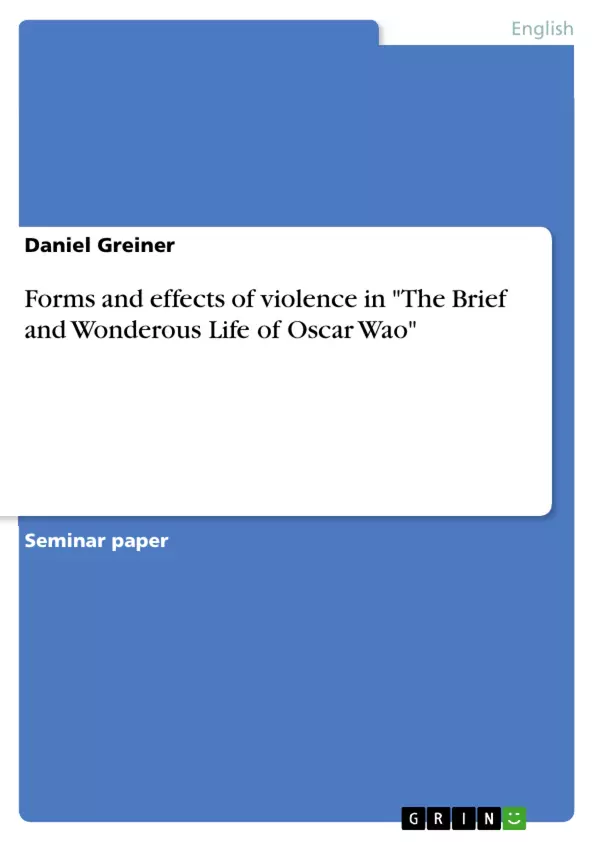Occurring in many different forms in the novel, violence is an important factor in The brief and wondrous life of Oscar Wao. It seems that violence in his various forms has its origin in the Spanish colonization, which expands to shape the whole society. This colonial past - which is above all a violent past - of the Dominican Republic and the structures it has left on the current Dominican society influences the life of the characters of the novel enormously. Although the colonial period of the Dominican Republic is over, its effects are still noticeable in various forms and its structures and effects still persist.
Table of Contents
- Introduction
- Erasing history as a form of violence
- Sex, gender and violence
- Domestic violence and slavery
- The novel as Zafa – writing as a form of counter violence
- Language as immigrant experience
- Diaz's way of rewriting history
- Conclusion
Objectives and Key Themes
This paper analyzes the various forms of violence present in Junot Diaz's The Brief and Wonderous Life of Oscar Wao and their connection to the colonial past of the Dominican Republic. It explores how the enduring impact of colonialism, embodied in the curse of "fukú," manifests in different forms of violence, including domestic, political, sexual, racial, and historical violence, as well as enslavement and violence against individual identities.
- The impact of the "plantation machine" on Dominican society and its enduring legacy
- The role of historical erasure and the manipulation of history in perpetuating violence
- The exploration of different forms of violence, including domestic violence, slavery, and gender-based violence
- The use of language and storytelling as a form of resistance against colonial oppression
- The novel as a testament to the resilience of the Dominican community in the face of adversity
Chapter Summaries
The introduction establishes violence as a central theme in The Brief and Wonderous Life of Oscar Wao, connecting it to the legacy of Spanish colonization and the enduring "fukú" curse. The concept of the "plantation machine" is introduced to explain the continuous impact of colonial structures on Dominican society.
Chapter two focuses on the erasure of history as a form of violence. It examines how the dominant western historiography has silenced the voices of the colonized, leaving a blank page in Dominican history. The chapter explores how the curse of "fukú" is linked to the arrival of European colonizers and the destruction of the Taino culture.
Keywords
The key themes and concepts explored in this paper include: violence, colonialism, Dominican Republic, "fukú," "plantation machine," historical erasure, identity, language, resistance, storytelling, and the Caribbean.
Frequently Asked Questions
What is the central role of violence in "The Brief and Wondrous Life of Oscar Wao"?
Violence is a central theme that shapes the lives of all characters. It is presented as an enduring legacy of the Spanish colonization of the Dominican Republic.
What does the term "fukú" signify in the novel?
"Fukú" is a curse believed to have arrived with European colonizers. It represents the historical and supernatural violence that haunts the Dominican people.
How does the "plantation machine" influence Dominican society?
The "plantation machine" refers to the colonial structures of exploitation and control that persist in modern Dominican society, manifesting as systemic violence and social inequality.
What is "Zafa" in the context of Junot Díaz's writing?
"Zafa" is a counter-spell to the "fukú" curse. The novel itself is viewed as a "Zafa," using storytelling and language to resist and rewrite a violent history.
How are gender and sex related to violence in the book?
The novel explores how colonial structures impose rigid gender roles and how sexual violence is used as a tool of oppression and power within the Dominican community.
- Quote paper
- Daniel Greiner (Author), 2012, Forms and effects of violence in "The Brief and Wonderous Life of Oscar Wao", Munich, GRIN Verlag, https://www.grin.com/document/199527



